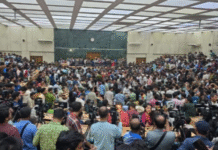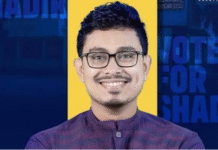
The official death toll from Iran’s wave of popular unrest shot up yesterday to at least 17 as popular anger has flared over the death in custody of the young Kurdish woman Mahsa Amini.
However, the Oslo-based non-government group Iran Human Rights said at least 31 civilians had been killed in a crackdown by the Iranian security forces in six nights of violence.
The Kurdish woman Amini, 22, died last week after she had been arrested by the Islamic republic’s feared morality police for allegedly wearing a hijab headscarf in an “improper” way, sparking widespread outrage.
“Death to the dictator” and “Woman, life, freedom”, protesters could be heard shouting in video footage shared online, during the biggest wave of protests to rock the country in almost three years.
Among those killed in clashes have been police and militia officers, state TV reported, while overseas-based human rights groups reported many more deaths, which could not be independently verified.
Security forces have fired at crowds with birdshot and metal pellets, and also deployed water cannon, according to Amnesty International and other human rights groups.
There were fears violence could escalate further after Iranian authorities restricted internet access and blocked messaging apps including WhatsApp and Instagram, as they have done before past crackdowns.
“People in Iran are being cut off from online apps and services,” Instagram chief Adam Mosseri tweeted, adding that “we hope their right to be online will be reinstated quickly”.
Iran’s powerful Revolutionary Guards yesterday called on the Islamic Republic’s judiciary to prosecute “those who spread false news and rumours”, reported Reuters.
The United States placed Iran’s morality police on its sanctions blacklist yesterday.
Some women have burnt their scarves and symbolically cut their hair in protest at the strict dress code, in defiant actions echoed in solidarity protests abroad from New York to Istanbul.
Activists have said that Amini, whose Kurdish first name is Jhina, after her detention in Tehran suffered a fatal blow to the head — a claim denied by officials, who have announced an investigation.
Iranian women on the streets of Tehran told AFP they were now more careful about their dress to avoid run-ins with the morality police.
“I’m frightened,” said Nazanin, a 23-year-old nurse who asked to be identified by her first name only for safety reasons, adding she believed the morality police “shouldn’t confront people at all”.
US President Joe Biden in an address to the UN General Assembly on Wednesday said that “we stand with the brave citizens and the brave women of Iran who right now are demonstrating to secure their basic rights”.
Iran’s ultra-conservative President Ebrahim Raisi, speaking later in the same forum, complained of a “double standard” and pointed to Israeli actions in the Palestinian territories and the deaths of indigenous women in Canada.










